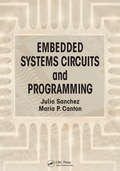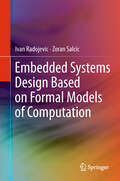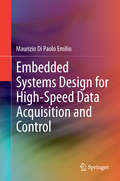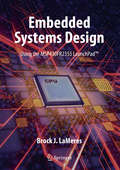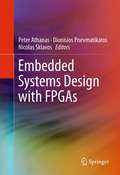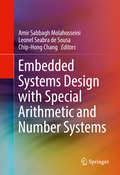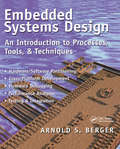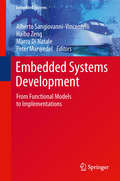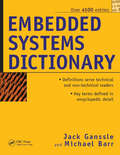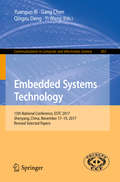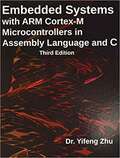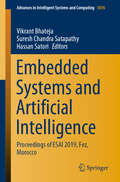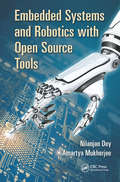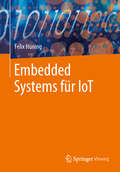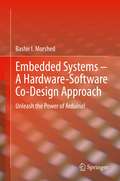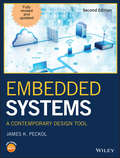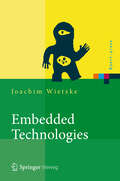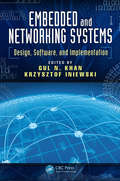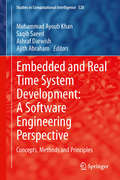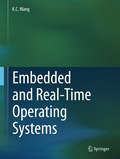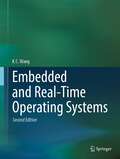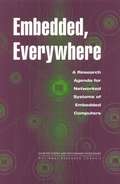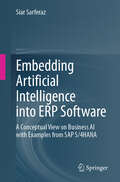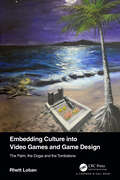- Table View
- List View
Embedded Systems Circuits and Programming
by Julio Sanchez Maria P. CantonDuring the development of an engineered product, developers often need to create an embedded system—a prototype—that demonstrates the operation/function of the device and proves its viability. Offering practical tools for the development and prototyping phases, Embedded Systems Circuits and Programming provides a tutorial on microcontroller programming and the basics of embedded design. The book focuses on several development tools and resources: Standard and off-the-shelf components, such as input/output devices, integrated circuits, motors, and programmable microcontrollers The implementation of circuit prototypes via breadboards, the in-house fabrication of test-time printed circuit boards (PCBs), and the finalization by the manufactured board Electronic design programs and software utilities for creating PCBs Sample circuits that can be used as part of the targeted embedded system The selection and programming of microcontrollers in the circuit For those working in electrical, electronic, computer, and software engineering, this hands-on guide helps you successfully develop systems and boards that contain digital and analog components and controls. The text includes easy-to-follow sample circuits and their corresponding programs, enabling you to use them in your own work. For critical circuits, the authors provide tested PCB files.
Embedded Systems Design Based on Formal Models of Computation
by Zoran Salcic Ivan Radojevic"Models of Computation for Heterogeneous Embedded Systems" presents a model of computation for heterogeneous embedded systems called DFCharts. It targets heterogeneous systems by combining finite state machines (FSM) with synchronous dataflow graphs (SDFG). FSMs are connected in the same way as in Argos (a Statecharts variant with purely synchronous semantics) using three operators: synchronous parallel, refinement and hiding. The fourth operator, called asynchronous parallel, is introduced in DFCharts to connect FSMs with SDFGs. In the formal semantics of DFCharts, the operation of an SDFG is represented as an FSM. Using this representation, SDFGs are merged with FSMs so that the behaviour of a complete DFCharts specification can be expressed as a single, flat FSM. This allows system properties to be verified globally. The practical application of DFCharts has been demonstrated by linking it to widely used system-level languages Java, Esterel and SystemC.
Embedded Systems Design for High-Speed Data Acquisition and Control
by Maurizio Di Paolo EmilioThis book serves as a practical guide for practicing engineers who need to design embedded systems for high-speed data acquisition and control systems. A minimum amount of theory is presented, along with a review of analog and digital electronics, followed by detailed explanations of essential topics in hardware design and software development. The discussion of hardware focuses on microcontroller design (ARM microcontrollers and FPGAs), techniques of embedded design, high speed data acquisition (DAQ) and control systems. Coverage of software development includes main programming techniques, culminating in the study of real-time operating systems. All concepts are introduced in a manner to be highly-accessible to practicing engineers and lead to the practical implementation of an embedded board that can be used in various industrial fields as a control system and high speed data acquisition system.
Embedded Systems Design using the MSP430FR2355 LaunchPad™
by Brock J. LaMeresThis textbook for courses in Embedded Systems introduces students to necessary concepts, through a hands-on approach. LEARN BY EXAMPLE – This book is designed to teach the material the way it is learned, through example. Every concept is supported by numerous programming examples that provide the reader with a step-by-step explanation for how and why the computer is doing what it is doing. LEARN BY DOING – This book targets the Texas Instruments MSP430 microcontroller. This platform is a widely popular, low-cost embedded system that is used to illustrate each concept in the book. The book is designed for a reader that is at their computer with an MSP430FR2355 LaunchPadTM Development Kit plugged in so that each example can be coded and run as they learn. LEARN BOTH ASSEMBLY AND C – The book teaches the basic operation of an embedded computer using assembly language so that the computer operation can be explored at a low-level. Once more complicated systems are introduced (i.e., timers, analog-to-digital converters, and serial interfaces), the book moves into the C programming language. Moving to C allows the learner to abstract the operation of the lower-level hardware and focus on understanding how to “make things work”. BASED ON SOUND PEDAGOGY - This book is designed with learning outcomes and assessment at its core. Each section addresses a specific learning outcome that the student should be able to “do” after its completion. The concept checks and exercise problems provide a rich set of assessment tools to measure student performance on each outcome.
Embedded Systems Design with FPGAs
by Dionisios Pnevmatikatos Peter Athanas Nicolas SklavosThis book presents the methodologies and for embedded systems design, using field programmable gate array (FPGA) devices, for the most modern applications. Coverage includes state-of-the-art research from academia and industry on a wide range of topics, including applications, advanced electronic design automation (EDA), novel system architectures, embedded processors, arithmetic, and dynamic reconfiguration.
Embedded Systems Design with Special Arithmetic and Number Systems
by Chip-Hong Chang Amir Sabbagh Molahosseini Leonel Seabra de SousaThis book introduces readers to alternative approaches to designing efficient embedded systems using unconventional number systems. The authors describe various systems that can be used for designing efficient embedded and application-specific processors, such as Residue Number System, Logarithmic Number System, Redundant Binary Number System Double-Base Number System, Decimal Floating Point Number System and Continuous Valued Number System. Readers will learn the strategies and trade-offs of using unconventional number systems in application-specific processors and be able to apply and design appropriate arithmetic operations from these number systems to boost the performance of digital systems.
Embedded Systems Design: An Introduction to Processes, Tools, and Techniques
by Arnold Berger* Hardware/Software Partitioning * Cross-Platform Development * Firmware Debugging * Performance Analysis * Testing & Integration Get into embedded systems programming with a clear understanding of the development cycle and the specialized aspects of
Embedded Systems Development: From Functional Models to Implementations
by Alberto Sangiovanni-Vincentelli Haibo Zeng Marco Di Natale Peter MarwedelThis book offers readers broad coverage of techniques to model, verify and validate the behavior and performance of complex distributed embedded systems. The authors attempt to bridge the gap between the three disciplines of model-based design, real-time analysis and model-driven development, for a better understanding of the ways in which new development flows can be constructed, going from system-level modeling to the correct and predictable generation of a distributed implementation, leveraging current and future research results.
Embedded Systems Dictionary
by Jack GanssleThis technical dictionary defines the 2,500 most-used words in the embedded systems field, with over 4,500 entries and cross-references. Designed to serve both the technical and non-technical audience, this book defines advanced terms in two steps. The fi
Embedded Systems Technology: 15th National Conference, ESTC 2017, Shenyang, China, November 17-19, 2017, Revised Selected Papers (Communications in Computer and Information Science #857)
by Gang Chen Yi Wang Yuanguo Bi Qingxu DengThis book constitutes the refereed proceedings of the 15th National Conference on Embedded Systems Technology, ESTC 2017, held in Shenyang, China, in November 2017.The 18 revised full papers presented were carefully reviewed and selected from 45 papers. The topics cover a broad range of fields focusing on the theme "embedded systems and intelligent computing," such as context aware computing, scheduling, cyber physical system, high performance embedded computing, embedded system and applications, and education and surveys.
Embedded Systems With Arm (register Mark) Cortex-m Microcontrollers In Assembly Language And C
by Yifeng ZhuSignificant changes in the third edition include updated serial communication description (UART, SPI, and I2C), new serial communication examples, incorporation of GNU gcc compiler, low power modes, modification of example programs from STM32L1 (Cortex-M3) to STM32L4 (Cortex-M4). The book introduces basic programming of ARM Cortex-M cores in assembly and C at the register level, and the fundamentals of embedded system design. It presents basic concepts such as data representations (integer, fixed-point, floating-point), assembly instructions, stack, and implementing basic controls and functions of C language at the assembly level. It covers advanced topics such as interrupts, mixing C and assembly, direct memory access (DMA), system timers (SysTick), multi-tasking, SIMD instructions for digital signal processing (DSP), and instruction encoding/decoding. The book also gives detailed examples of interfacing peripherals, such as general purpose I/O (GPIO), LCD driver, keypad interaction, stepper motor control, PWM output, timer input capture, DAC, ADC, real-time clock (RTC), and serial communication (USART, I2C, SPI, and USB).
Embedded Systems and Artificial Intelligence: Proceedings of ESAI 2019, Fez, Morocco (Advances in Intelligent Systems and Computing #1076)
by Suresh Chandra Satapathy Vikrant Bhateja Hassan SatoriThis book gathers selected research papers presented at the First International Conference on Embedded Systems and Artificial Intelligence (ESAI 2019), held at Sidi Mohamed Ben Abdellah University, Fez, Morocco, on 2–3 May 2019. Highlighting the latest innovations in Computer Science, Artificial Intelligence, Information Technologies, and Embedded Systems, the respective papers will encourage and inspire researchers, industry professionals, and policymakers to put these methods into practice.
Embedded Systems and Robotics with Open Source Tools
by Nilanjan Dey Amartya MukherjeeEmbedded Systems and Robotics with Open-Source Tools provides easy-to-understand and easy-to-implement guidance for rapid prototype development. Designed for readers unfamiliar with advanced computing technologies, this highly accessible book: Describes several cutting-edge open-source software and hardware technologies Examines a number of embedded computer systems and their practical applications Includes detailed projects for applying rapid prototype development skills in real time Embedded Systems and Robotics with Open-Source Tools effectively demonstrates that, with the help of high-performance microprocessors, microcontrollers, and highly optimized algorithms, one can develop smarter embedded devices.
Embedded Systems for Biomedical Applications (High-Performance Computing for Smart Healthcare)
by Rishabha Malviya Selcan Karakuş Mukesh RoyThis book is an essential guide to the constantly changing environment of embedded systems in healthcare in a world where the convergence of technology and healthcare is becoming increasingly important. It further explains different scenarios corresponding to the latest technologies in the healthcare system for early diagnosis, enhanced treatment, and cure of diseases, including remote patient monitoring, cardiac monitoring, and deep learning for remediation.Features:• Emphasizes how embedded systems contribute to clinical care by facilitating personalized treatment and informed decision-making for healthcare professionals.• Highlights the role of embedded systems in tracking treatment progress, enabling healthcare professionals to monitor patient responses and adjust treatment plans accordingly.• Explores the application of embedded systems in remote patient monitoring, allowing for continuous health monitoring outside traditional healthcare settings.• Presents the integration of deep learning and telecommunication technology with embedded systems, optimizing their efficiency and utilization in biomedical applications.• Offers insights into future prospects for advancing biomedical applications through embedded systems, providing a roadmap for further innovation and development in the field.This reference work is useful for scholars and professionals interested in the applications and optimization of emerging smart technologies in the field of healthcare.
Embedded Systems für IoT
by Felix HüningIntelligente Systeme und Komponenten sind die zentralen Elemente des Internets der Dinge (Internet of Things, IoT). Die Realisierung dieser Komponenten erfordert detaillierte Kenntnisse sowohl der zugrunde liegenden Hardware als auch der dazugehörigen Software. In dem Buch werden alle wesentlichen Aspekte der Hard- und Software von Embedded Systems für IoT dargestellt: von Integrated Solution Development Environment (ISDE) über Board Support Package (BSP), Mikrocontroller, Software-Schichten, Hardware Abstraction Layer (HAL) und Real-Time Operating System (RTOS) bis zu Framework and Functional Libraries, Middleware und Connectivity.Die Komplexität der Systeme als auch der Hard- und Software nimmt von Jahr zu Jahr zu und stellt Anwender vor immer neue Herausforderungen. Damit Leser trotzdem den Überblick behalten und ihnen die Verknüpfung von Theorie und Praxis gelingt, verwendet der Autor ein durchgehendes Praxisbeispiel. Anhand der Renesas SynergyTM Platform beschreibt er den generellen Aufbau der Hard- und Software von eingebetteten Systemen. Diese Plattform dient dann auch als Ausgangsbasis für den praktischen Teil des Buchs. Aufbauend auf einem Renesas SynergyTM StarterKit können Leser einer Schritt-für-Schritt-Anleitung für die Entwicklung einer eigenen IoT-Anwendung aus dem Bereich Smart Home folgen. Auf diese Art und Weise werden Leser in die Lage versetzt, ihr theoretisches Wissen direkt anzuwenden.
Embedded Systems – A Hardware-Software Co-Design Approach: Unleash the Power of Arduino!
by Bashir I MorshedThis textbook introduces the concept of embedded systems with exercises using Arduino Uno. It is intended for advanced undergraduate and graduate students in computer science, computer engineering, and electrical engineering programs. It contains a balanced discussion on both hardware and software related to embedded systems, with a focus on co-design aspects. Embedded systems have applications in Internet-of-Things (IoT), wearables, self-driving cars, smart devices, cyberphysical systems, drones, and robotics. The hardware chapter discusses various microcontrollers (including popular microcontroller hardware examples), sensors, amplifiers, filters, actuators, wired and wireless communication topologies, schematic and PCB designs, and much more. The software chapter describes OS-less programming, bitmath, polling, interrupt, timer, sleep modes, direct memory access, shared memory, mutex, and smart algorithms, with lots of C-code examples for Arduino Uno. Other topics discussed are prototyping, testing, verification, reliability, optimization, and regulations. Appropriate for courses on embedded systems, microcontrollers, and instrumentation, this textbook teaches budding embedded system programmers practical skills with fun projects to prepare them for industry products.Introduces embedded systems for wearables, Internet-of-Things (IoT), robotics, and other smart devices;Offers a balanced focus on both hardware and software co-design of embedded systems;Includes exercises, tutorials, and assignments.
Embedded Systems: A Contemporary Design Tool
by James K. PeckolEmbedded Systems: A Contemporary Design Tool, Second Edition Embedded systems are one of the foundational elements of today’s evolving and growing computer technology. From operating our cars, managing our smart phones, cleaning our homes, or cooking our meals, the special computers we call embedded systems are quietly and unobtrusively making our lives easier, safer, and more connected. While working in increasingly challenging environments, embedded systems give us the ability to put increasing amounts of capability into ever-smaller and more powerful devices. Embedded Systems: A Contemporary Design Tool, Second Edition introduces you to the theoretical hardware and software foundations of these systems and expands into the areas of signal integrity, system security, low power, and hardware-software co-design. The text builds upon earlier material to show you how to apply reliable, robust solutions to a wide range of applications operating in today’s often challenging environments. Taking the user’s problem and needs as your starting point, you will explore each of the key theoretical and practical issues to consider when designing an application in today’s world. Author James Peckol walks you through the formal hardware and software development process covering: Breaking the problem down into major functional blocks; Planning the digital and software architecture of the system; Utilizing the hardware and software co-design process; Designing the physical world interface to external analog and digital signals; Addressing security issues as an integral part of the design process; Managing signal integrity problems and reducing power demands in contemporary systems; Debugging and testing throughout the design and development cycle; Improving performance. Stressing the importance of security, safety, and reliability in the design and development of embedded systems and providing a balanced treatment of both the hardware and the software aspects, Embedded Systems: A Contemporary Design Tool, Second Edition gives you the tools for creating embedded designs that solve contemporary real-world challenges.
Embedded Technologies
by Joachim WietzkeDer Weg von der Inbetriebnahme eines Prozessorsystems bis zur Implementierung einer Human Machine Interface (HMI) bildet den Schwerpunkt dieses Werks. Der Autor erläutert, wie Treiber und Betriebssystem (QNX, Linux) konfiguriert, gebaut und geladen werden. Alle notwendigen Kenntnisse werden systematisch und fundiert vermittelt, auch Fragen der Virtualisierung und der Einsatz von MultiCore-Systemen. Der Band enthält praktische Beispiele sowie Anleitungen für die Fehlersuche und die Performance-Optimierung, Code-Snippets werden zur Verfügung gestellt.
Embedded and Networking Systems: Design, Software, and Implementation (Devices, Circuits, and Systems #18)
by GUL N. KHAN AND KRZYSZTOF INIEWSKIEmbedded and Networking Systems: Design, Software, and Implementation explores issues related to the design and synthesis of high-performance embedded computer systems and networks. The emphasis is on the fundamental concepts and analytical techniques that are applicable to a range of embedded and networking applications, rather than on specific embedded architectures, software development, or system-level integration. This system point of view guides designers in dealing with the trade-offs to optimize performance, power, cost, and other system-level non-functional requirements. The book brings together contributions by researchers and experts from around the world, offering a global view of the latest research and development in embedded and networking systems. Chapters highlight the evolution and trends in the field and supply a fundamental and analytical understanding of some underlying technologies. Topics include the co-design of embedded systems, code optimization for a variety of applications, power and performance trade-offs, benchmarks for evaluating embedded systems and their components, and mobile sensor network systems. The book also looks at novel applications such as mobile sensor systems and video networks. A comprehensive review of groundbreaking technology and applications, this book is a timely resource for system designers, researchers, and students interested in the possibilities of embedded and networking systems. It gives readers a better understanding of an emerging technology evolution that is helping drive telecommunications into the next decade.
Embedded and Real Time System Development: A Software Engineering Perspective
by Ajith Abraham Saqib Saeed Ashraf Darwish Mohammad Ayoub KhanNowadays embedded and real-time systems contain complex software. The complexity of embedded systems is increasing, and the amount and variety of software in the embedded products are growing. This creates a big challenge for embedded and real-time software development processes and there is a need to develop separate metrics and benchmarks. "Embedded and Real Time System Development: A Software Engineering Perspective: Concepts, Methods and Principles" presents practical as well as conceptual knowledge of the latest tools, techniques and methodologies of embedded software engineering and real-time systems. Each chapter includes an in-depth investigation regarding the actual or potential role of software engineering tools in the context of the embedded system and real-time system. The book presents state-of-the art and future perspectives with industry experts, researchers, and academicians sharing ideas and experiences including surrounding frontier technologies, breakthroughs, innovative solutions and applications. The book is organized into four parts "Embedded Software Development Process", "Design Patterns and Development Methodology", "Modelling Framework" and "Performance Analysis, Power Management and Deployment" with altogether 12 chapters. The book is aiming at (i) undergraduate students and postgraduate students conducting research in the areas of embedded software engineering and real-time systems; (ii) researchers at universities and other institutions working in these fields; and (iii) practitioners in the R&D departments of embedded system. It can be used as an advanced reference for a course taught at the postgraduate level in embedded software engineering and real-time systems.
Embedded and Real-Time Operating Systems
by K. C. WangThis book covers the basic concepts and principles of operating systems, showing how to apply them to the design and implementation of complete operating systems for embedded and real-time systems. It includes all the foundational and background information on ARM architecture, ARM instructions and programming, toolchain for developing programs, virtual machines for software implementation and testing, program execution image, function call conventions, run-time stack usage and link C programs with assembly code. It describes the design and implementation of a complete OS for embedded systems in incremental steps, explaining the design principles and implementation techniques. For Symmetric Multiprocessing (SMP) embedded systems, the author examines the ARM MPcore processors, which include the SCU and GIC for interrupts routing and interprocessor communication and synchronization by Software Generated Interrupts (SGIs). Throughout the book, complete working sample systems demonstrate the design principles and implementation techniques. The content is suitable for advanced-level and graduate students working in software engineering, programming, and systems theory.
Embedded and Real-Time Operating Systems
by K. C. WangThis book covers the basic concepts and principles of operating systems, showing how to apply them to the design and implementation of complete operating systems for embedded and real-time systems. It includes all the foundational and background information on ARM architecture, ARM instructions and programming, toolchain for developing programs, virtual machines for software implementation and testing, program execution image, function call conventions, run-time stack usage and link C programs with assembly code.Embedded and Real-Time Operating Systems describes the design and implementation of a complete OS for embedded systems in incremental steps, explaining the design principles and implementation techniques. For Symmetric Multiprocessing (SMP) embedded systems, the author examines the ARM MPcore processors, which include the SCU and GIC for interrupts routing and interprocessor communication and synchronization by Software Generated Interrupts (SGIs).This Second Edition covers ARM64 architecture and programming. These include exception levels, vector tables and exceptions handling, GICv3 programming and interrupt processing. It covers virtual to physical address mappings in ARMv8, and shows a 64-bit OS with kernel space in EL1 and separate user spaces in EL0. It also covers ARM TrustZone technology and secure systems. These include hardware and software architectures for secure and normal worlds, interactions and switching between the two worlds. It shows a secure world comprising a secure monitor in EL3 to provide service functions, and a normal world comprising processes in non-secure EL1, which use SMC to access service functions in the secure world.Throughout the book, complete working sample systems demonstrate the design principles and implementation techniques. The content is suitable for advanced-level and graduate students working in software engineering, programming, and systems theory.
Embedded, Everywhere: A Research Agenda for Networked Systems of Embedded Computers
by Committee on Networked Systems of Embedded ComputersAdvances in the miniaturization and networking of microprocessors promise a _day when networked computers are embedded throughout the everyday world. However, our current understanding of what such systems would be like is insufficient to bring the promise to reality. Embedded, Everywhere explores the potential of networked systems of embedded computers and the research challenges arising from embedding computation and communications technology into a wide variety of applications—from precision agriculture to automotive telematics to defense systems. It describes how these emerging networks operate under unique constraints not present in more traditional distributed systems, such as the Internet. It articulates how these networks will have to be dynamically adaptive and self-configuring, and how new models for approaching programming and computation are necessary. Issues relating to trustworthiness, security, safety, reliability, usability, and privacy are examined in light of the ubiquitous nature of these systems. A comprehensive, systems-oriented research agenda is presented, along with recommendations to major federal funding agencies.
Embedding Artificial Intelligence into ERP Software: A Conceptual View on Business AI with Examples from SAP S/4HANA
by Siar SarferazThis book explains how to embed artificial intelligence in digitized business processes of ERP software by solving the two related substantial challenges: how can artificial intelligence be systematically integrated into ERP business processes for ease of consumption, and how can artificial intelligence be made enterprise-ready by covering ERP qualities like compliance, lifecycle management, extensibility, or scalability? As a general introduction, the first part of this book takes the reader through a historical journey towards intelligent ERP systems. In addition, reference processes and a reference architecture for ERP systems are proposed which build the foundation for the suggested subsequent solution concept, including a method for operationalizing intelligence for ERP business processes. Subsequently, in the second part detailed concepts of embedding artificial intelligence into ERP software are proposed. In this context the suggested solution architecture is depicted, and specific topics are resolved like data integration, model validation, explainability, data protection and privacy, model degradation and performance. In the last part an implementation framework is suggested which enables the previously introduced concepts and harmonizes the development and operations of artificial intelligent ERP applications. This part concludes with case studies considering artificial intelligence scenarios of SAP S/4HANA in the areas of logistics, finance and sales which apply the defined solution approach and shows its real-world feasibility. This book is written for professionals who want to implement (as developers) or exploit (as business analysts or consultants) or consider/plan the implementation/exploitation (as managers) of artificial intelligence in business information systems.
Embedding Culture into Video Games and Game Design: The Palm, the Dogai and the Tombstone
by Rhett LobanThis book will help game designers and those interested in games thoughtfully embed culture into video games and the game design process. This book raises the issue of how some cultures and communities are misrepresented in various video games. In response to this problem, designers can bring cultural considerations and practices into the centre focus of the game design process. The book advocates that designers put different measures in place to better prevent misrepresentations and engage with deeper understandings of culture to build culturally richer and more meaningful game worlds. The book uses the Torres Strait Virtual Reality project as a primary example, in addition to other game projects, to explore cultural representation in game design. Torres Strait culture is also explored and discussed more broadly throughout the book. No prior knowledge of culture studies is needed, and the book deals with higher level game design with little reference to the technical elements of game development. This unique and timely book will appeal to those interested in the implications of cultural depictions in video games and opportunities to generate deeper cultural representations through the game design process.
